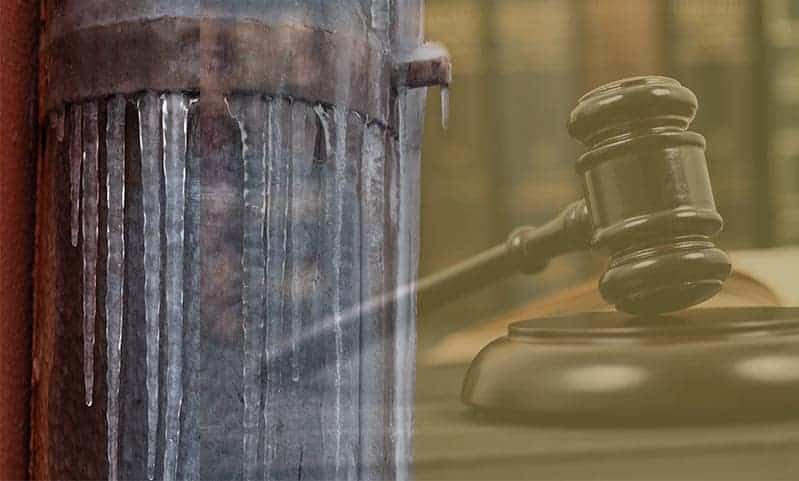A family from Conroe, a Houston suburb, claims hypothermia killed their 11-year-old son.
They also claim that the Electric Reliability Council Of Texas and Entergy Texas, its electricity provider, are responsible for his death.
The family lost power for two days as outside temperatures often hovered below 15 degrees. Infrastructure problems, mostly extended rolling blackouts and downed power lines, caused the power loss in Conroe and elsewhere.
Many Texans, including Governor Greg Abbott, have had harsh words for ERCOT. “The Electric Reliability Council of Texas has been anything but reliable over the past 48 hours,” the Republican said as he called for an investigation.
Meanwhile, in a prepared statement, ERCOT defended its actions.
“However, because approximately 46% of privately-owned generation tripped offline this past Monday morning, we are confident that our grid operators made the right choice to avoid a statewide blackout,” a spokesperson wrote.
The family’s attorney predicts that many more legal actions will follow this one.
Damages in a Wrongful Death Claim
To some, $100 million seems like nothing in this context. No amount of money could possibly make up for a loss like the sudden and untimely death of a small child.
To imply that money alone could compensate this family is borderline insulting.
However, since the judge cannot turn back the clock and reverse the chain of events, money is the only remedy available.
Furthermore, this award at least assuages the grief and suffering of survivors.
To others, $100 million may seem like an obscenely high figure. However, considering the wrongful death remedies in Texas, this sum suddenly seems reasonable. These items include:
- Medical bills related to the decedent’s final illness or injury,
- Decedent’s pain and suffering,
- Lost future financial contributions,
- Funeral and burial expenses, and
- Lost future emotional support.
To calculate how much financial support Cristian might have provided over the course of his life, a personal injury attorney usually partners with an accountant or other financial professional.
To calculate lost emotional support, most attorneys multiply the lost financial contributions by three, four, or five, depending on several factors.
In Texas, if their child is injured, parents are usually entitled to compensation for their own grief and suffering.
Most other states have similar laws. In other cases, survivors can file separate claims, such as negligent infliction of emotional distress, and obtain compensation.
Establishing Liability
But we are getting ahead of ourselves. Victim/plaintiffs are entitled to nothing unless they prove liability by a preponderance of the evidence (more likely than not).
This burden of proof is the lowest one in American law. Imagine two equally sized stacks of paper are sitting side by side.
If someone moves one sheet of paper from the right to the left, the stack on the left has more paper than the one on the right.
That’s a picture of a preponderance of the evidence.
It does not matter how much evidence the defendant produces or what legal theories the defendant uses.
If the victim/plaintiff has a little more evidence, that’s sufficient.
Evidence in these claims usually includes medical records and witness statements.
The medical records must state that hypothermia killed Cristian. It does not matter how many pre-existing conditions he had, if any.
The eggshell skull rule prevents defendants from using a victim’s vulnerabilities as an excuse to reduce or deny compensation.
Witness statements would probably determine actual liability.
In Texas, and in most other states, electricity companies have a contractual obligation to provide power to paying customers.
The impossibility doctrine is basically the only effective defense in this context.
Especially in this area, “impossible” is not synonymous with “difficult.” Difficulty of performance does not cancel contractual obligations.
Since millions of Texans kept power while millions of others lost power, the impossibility doctrine seems inapplicable in this case.
Procedurally, most civil claims settle out of court.
These resolutions usually benefit everyone. Settlements hasten the outcome of a case and give the parties more control over the outcome.
So, victims obtain compensation sooner, and a judge or jury does not dictate terms to the litigants.
A few claims quickly settle before the victim files legal paperwork.
But in cases like this one, where there is at least some question about liability, filing such paperwork is usually necessary.
At that point, most judges refer the dispute to mediation.
During mediation, each party has a duty to negotiate in good faith. Therefore, mediation is usually successful.
The legal fallout from the Texas 2021 winter storm is just beginning. For a free consultation with an experienced personal injury attorney in Texas, contact Napoli Shkolnik, PLLC. We have a local office in Austin.
